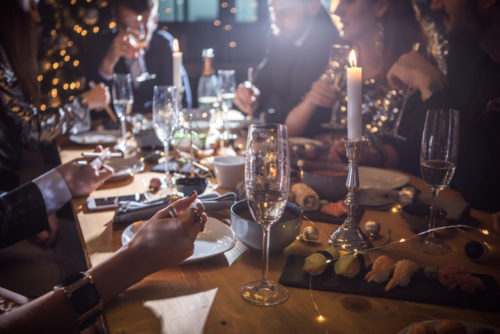Enjoying Sober Celebrations When You’ve Never Had One Before
Among the great challenges of addiction recovery are the “first one since sobering up” milestones: first happy hour without a beer, first major life challenge without a chemical stress reliever, first time explaining to Dad why you have to turn down the martinis he takes pride in making. And, from late November to early January, first winter-holiday season without wine, champagne, or hot toddies.
Count it a double blessing if you have friends and family who are committed to supporting your sobriety by serving only non-alcoholic options at their own gatherings. Still, the question of “Can I have a good time without drinking?” haunts many people new to recovery. If you aren’t careful, your thoughts can get so focused on what you can’t have that your good time really is spoiled.
By staying in recovery, you’ll realize soon enough that you’re happier and more fulfilled sober. If, however, you’re struggling with “poor me, my best friend won’t be there” thoughts in regard to a holiday celebration you plan to attend, there are steps you can take to remedy that problem.
DON’T JUST STAY HOME
If you’re tempted to skip an alcohol-free celebration altogether rather than risk being a wet blanket, don’t! It’s one thing if you’re a natural introvert and not that big on parties to begin with (in which case you may have drunk at past parties to numb your frustration at being “stuck” there). But if you love getting together with friends and are just worried it won’t be the same without a drink, being alone will just increase your self-pity (and your risk of relapse).
HAVE SOMETHING TO LOOK FORWARD TO
If you’re really worried about how well you’ll enjoy yourself without a cocktail, talk with the host in advance and find out:
• Who else will be at the party (ask to be introduced to someone interesting)
• What will be on the menu (surely you have some favorite foods and drinks with no intoxicating ingredients)
• If you can help greet people or serve hors d’oeuvres (staying busy is a proven antidote for discomfort)
• What activities are planned (not every party is all conversation and nibbling)
If you’re hosting, or helping to plan, a party yourself, include foods and activities that remind you of ways your support group celebrates sobriety anniversaries. That way, you’ll get an extra mental boost toward associating “fun” with “sobriety.”
GO AHEAD AND PUT SOMETHING IN YOUR MOUTH
Having something to nibble or sip on can compensate for losing the customary feel of a glass in your hand or wine on your tongue. Just don’t overdo it: a bellyache isn’t that big an improvement on a hangover. The best approach is to eat/drink slowly. Not only will it improve the overall experience, but warnings your stomach is nearing capacity will be more likely to register in time.
One word of warning: be sure that whatever you choose has no ingredients evocative of your problem drug. Even if rum cake or wine sauce has had all the intoxicating element cooked out (which isn’t always true), the taste alone can reactivate cravings. And if you lived for the “buzz” of cocaine, even strong coffee might produce a jolt that tempts to dangerous ideas.
PAY ATTENTION TO OTHERS
Whether through simple thoughtlessness or through reluctance to approach someone who seems uninterested, few party guests pay much attention to wallflowers. If you just lean against the wall wondering what to do with yourself, everyone else will probably ignore you. If your host hasn’t introduced you to anyone, take the initiative and introduce yourself. Once you get a conversation going, let the other party do most of the talking: you may learn about a sober activity that would be perfect for you.
BRING A FRIEND
Of course, if you spot someone you already know well, you have a conversation ready and waiting. If you aren’t sure you’ll know anyone, and are short on confidence for introducing yourself (especially if you always used “liquid courage” to help you in that situation), see if you can bring a guest to the party. Choose someone who would fit in well and is a proven supporter of your sobriety journey: this might be a good opportunity to introduce one of your support-group peers to your larger circle.
IF YOU STILL DON’T HAVE A GOOD TIME, DON’T BLAME THE ABSENCE OF ALCOHOL
Everyone has a bad day or night every now and then, for any number of reasons:
• Proneness to medical depression
• An encounter with someone who pushes your buttons
• Spilling or breaking something, or otherwise embarrassing yourself in front of the group
If this happens to you, stifle any thoughts of, “I knew I wouldn’t enjoy myself without a drink.” Remind yourself of how far you’ve come and the challenges you’ve already conquered. Affirm that you’ll learn from this experience and do better next time. Call your sobriety partner, or an understanding friend, to help put the situation in perspective.
There is happiness after addiction. An official celebration is as good a place as any to practice!

